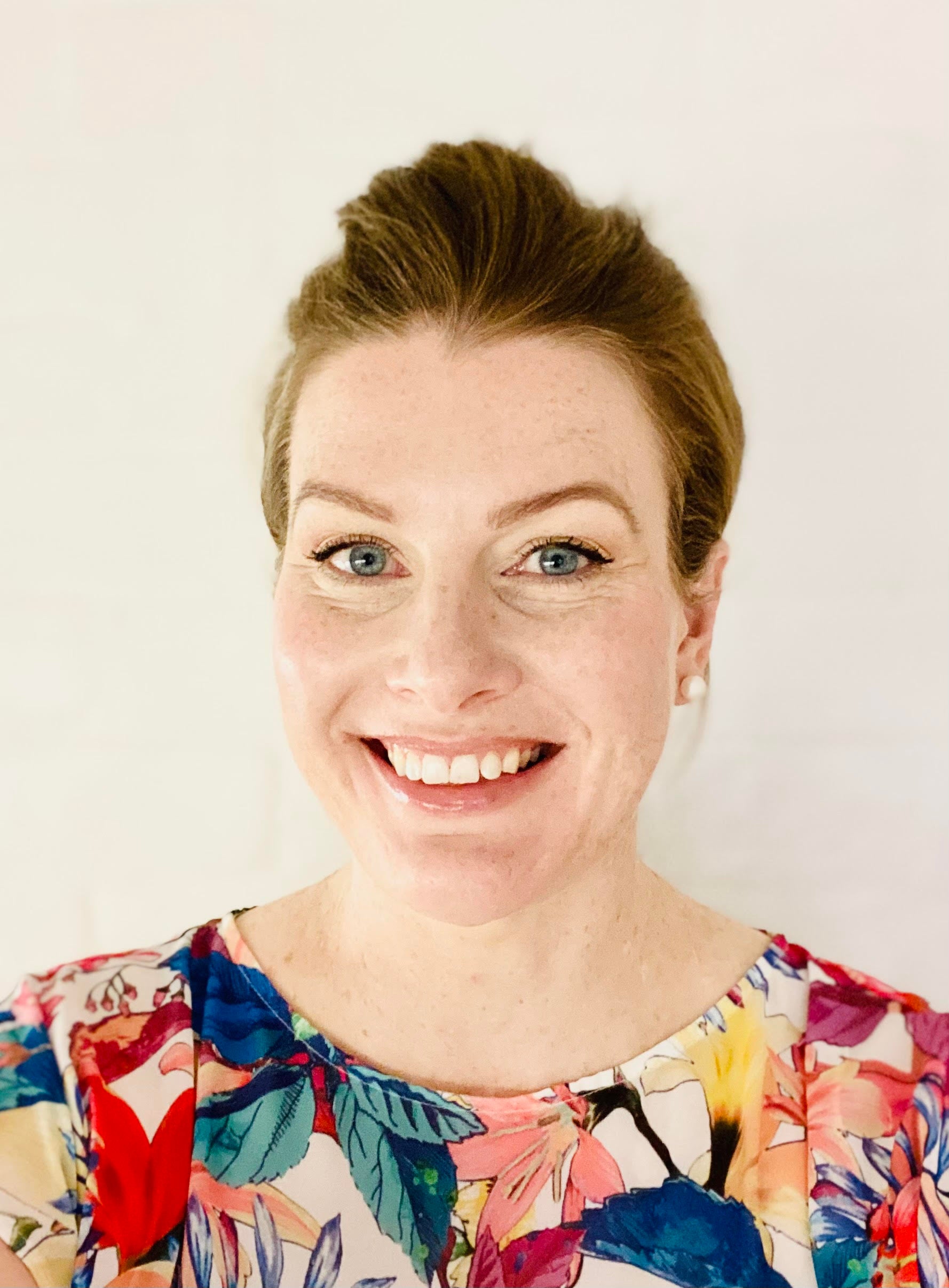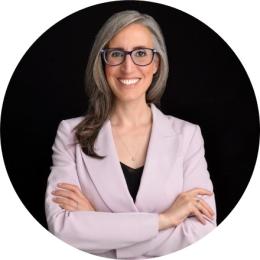Banner artwork by Art of Ngu / Shutterstock.com
Positive practices and mindsets help shape our careers and improve our lives. It is more important than ever to show up as our best selves to work while also finding new challenges and opportunities over a long-term career. For many, a fulfilling career includes pivoting along the way to move into new areas of interest and challenge. Having recently moved to a legal operations role, I thought about the difference in skills and mindset needed to transition roles.
This month, I spoke with ex-lawyers and legal operations professionals Michael Thompson, Deb Hook, Katrina Gowans, and Laurie David-Henric about their journey moving to legal operations roles, their mindsets, and positive practices.


What positive practices do you bring to your team and organization?
“I encourage my team to spend time in the office together instead of working from home all the time,” says Thompson, “And try to lead by example (also) in this regard.”
Hook’s team works “reasonable hours and flexibly where needed, so that they have time for their own positive practices!” She enjoys “helping people develop their own careers and encourages them to talk openly about their long-term plans and how we can work together to get them there.”

David-Henric empowers her team “to make decisions by themselves: I guide them in the right direction, toward the goal, but empower them to decide how to get there.”
How did you move into a legal operations role?
Thompson changed roles within his organization. Building up his team from scratch, Thompson, together with his team, defined their understanding of the legal operations function and focus areas according to the needs of the company and our internal customers.
Moving into a leadership role allowed him to leave behind IT contracts and negotiations. While he was happy to leave the area behind, his extensive work as legal counsel working on contracts gave him deep knowledge of contracting processes. He has always been someone who “tries to improve things” and questions “traditional principles,” wanting to make work smarter, not harder (a common trait I’ve noticed in people moving to an operations role).
Legal operations is a fairly nascent area in Germany, and, after getting a general understanding of what legal operations is, Thompson felt it “would be the perfect playing field for my next career step.”
Hook had worked as a lawyer for 16 years (six in private practice commercial/M&A and nine in-house at the University of Sydney) when the role came about — “when our last general counsel retired, one of our very senior lawyers was promoted into the GC role,” Hook says. “She wanted to future proof the office and undertake a cultural change program to introduce more innovation and a more strategic lens to the legal work we do. She asked me to build out a legal operations function to support that vision.”
For Gowans, the opportunity in the team came about after taking a career break to spend time with her unwell mom. “When I was ready to return,” she says, “My GC asked if I’d be interested in returning to the team in a different capacity to help lead an IT implementation for the legal team. It was intended to be a 12-month secondment, but I loved it so much and kept finding opportunities to help the team in new and interesting ways, that I stayed in legal ops.”
My current role is the aggregation of all my previous roles all in one, and I love it!

For David-Henric, the role happened naturally. Having started off her in-house career actively participating in the launch of the French office of a multinational company she was well versed in all aspects of the creation of a business. “As I moved up the ladder,” she said, “I took over more corporate and business responsibilities up to the managing director of that office. The opportunity came to switch to international project management, which was something I was already doing somehow.”
This was also the reason for moving from Paris to Toronto — “After building an amazing international team, I pitched for the creation of a new role within the company to optimize internal operational processes and did so successfully. My current role is the aggregation of all my previous roles all in one, and I love it!”
What mindset and skills did you need to move into legal ops?
Thompson reiterates that you need to strive for improvement and question traditional ways of doing things. He adds that “you need to be persistent — people don’t like change. And people don’t like those who want to change things even less.”
He considers the need to be able to live with this but also be able to convince people. "The best way is to show them how things can be done smarter, more efficient, and with a benefit for them. The rest will come itself. You need to understand people’s needs.”

For Hook, it is needing “a growth mindset and the ability to balance risk and opportunity to make a quick commercial decision and move forward.” She characterizes the role “as ultimately one of human change management. The ability to genuinely empathize with other’s perspectives, take them on a journey, and build solutions that work on the ground is where it’s at.”
From there she thinks the role can “take any number of focuses based on your skillset and interest (e.g., technology builds, crunching data, building professional development programs, knowledge management, communications and stakeholder engagement or — my favorite — legal design).”
Gowans says: “The biggest difference is switching from a role where people give you the problem or ask for legal advice, to a role where you need to determine what work you should do for maximum impact. So, there is a big mindset shift in terms of being self-motivated and organized rather than relying on someone to chase you.”
David-Henric thinks the focus is on analyzing your natural abilities (see her tips below). “Additionally, a legal ops person is a business person, an 'intrapreneur' — running the legal ops is like running a business without the ability to directly generate revenue! It’s very challenging and paved with uncertainty and resistance.”
The biggest difference is switching from a role where people give you the problem or ask for legal advice, to a role where you need to determine what work you should do for maximum impact.
What does success mean to you now in the ops role?
For Thompson, success means “seeing my team develop and every individual improving and growing. On a professional level, success means improving processes, seeing the smile on people’s faces when they tell me how much their everyday work improved, how much more efficiently they can get things done. It also involves exploring new methods of accomplishing tasks, such as uncovering a novel feature of a tool you’re using and grasping the opportunities it presents for you and others.”

Hook views success in legal ops as “defined by your projects adding value to both the legal team and the business — that can be a tough balance to achieve. Working at a nonprofit teaching and research institution, success for me personally means having a meaningful impact on the quality of our teaching and research by enabling that to happen — either through strategic input or by simplifying processes to free up more time to focus on what we’re really here for as a whole.”
For Gowans, success means “that the lawyers understand my role and can see the value that I bring to the team. But equally I gauge success based on things running smoothly in the team or having great data at the lawyers' fingertips when they need it.”
In addition, David-Henric also sees success in different ways:
- Lawyers telling me: “Wow, this new tool is so great, it really saves me tons of time;”
- Having optimized a process or a team without layoffs, just by reallocating people to the right roles;
- Creating capacity by leveraging a better process and/or technology; and
- Meeting cost saving objectives without layoffs.
How have you kept positive and found ways to celebrate success in the new role?
Thompson tries to be a role-model for his team. “If I do not stay positive, how can I expect them to do so? I have confidence in my team and know that they are able to find a solution for any problem. And when they do, we celebrate success together. That does not always work out as good as described. There are ups and downs. But we will for example finish a big project end of the year. And we will celebrate that accordingly.”
Hook makes “sure our successes are seen and celebrated in our newsletters and team meetings. But what really matters is when you have been toiling away on some incredibly difficult technology thing where you’re learning as you go and you make it work. That moment we can call out to each other that we’ve unlocked a new level and cheer. I think maybe that is a personality type — being like a dog with a bone and delighted when you finally crack that nut! Our GC, team, and the business have also been huge supporters of our projects, so we are super lucky in that regard and really feel valued.”
Staying positive can, at times, be frustrating. "When frustrated or saddened by a situation, I try to take a step back, move away from my desk, and breathe. I also like the technique of typing your emotional response to a frustrated situation, it helps getting things out of your chest and allows you to think straight again."
Laurie David-Henric, global head of legal ops and strategy, manulife

Gowans gets “a lot of energy from connecting with people, both in my organization and externally.”
Manulife, David-Henric’s company, has a great system of recognition system, she says, where you can send private or public shout out to your teammates or other colleagues for small and big successes. "I love this system. I also created a newsletter that is heavily focused on celebrating successes across our organization.”
She says for someone who throws herself 200 percent into her role, staying positive can, at times, be frustrating. “When frustrated or saddened by a situation, I try to take a step back, move away from my desk, and breathe. I also like the technique of typing your emotional response to a frustrated situation, it helps getting things out of your chest and allows you to think straight again.”
Tips for people wanting to either move to ops or start ops work in their legal roles?
Thompson’s tips are:
- Start by thinking about how to improve your own daily work by making processes more efficient or automating certain tasks before looking at special tools — you can automate workflows with Excel, if you put some thought into it;
- Look at Microsoft Power Platform (Forms, Power Automate, Power Apps) as this “changes everything.” Play around with those tools but most important, start to question “Why are we doing it this way?” “Is this the most efficient way to do it?” “Can we achieve the same result in a less time consuming or labor intensive way?”
- Considering AI, ask “Does this have to be done manually?” “Is it not possible to use expensive workforce somewhere else instead and automate the process?”
- Learn to see the processes from a different perspective. “I also have to be able to convince people more than before.” As a legal counsel he could say “It is the law. Live with it.” Or “I am the expert and this is my advice.” His new role means he has to “show people the value they get if they follow my suggestions;”
- Understand and be able to design workflows and processes. On a piece of paper or within a software tool; and
- Find creative solutions, communicate clearly with lawyers and legal laymans, automate workflows etc. "That is the reason why legal operations is such a cool field of practice — because it needs such a wide variety of skills.”
Hook suggests:
- Either pitch the idea internally and see whether they’ll give it a go, or chat to people already in the field and make lots of connections or leveraging “such a happy, enthusiastic, and welcoming community” who will go out of their way to help you;
- Checking the resources from the College of Law’s Centre for Legal Innovation to learn more about the roles before committing;
- Asking for a secondment to the business or externally is a safe way to test the waters;
- Lean into and learn to foster a “safe to experiment, safe to fail environment, safe to ask for 360 feedback” to encourage innovation, growth, and success. You need to be quite vulnerable to do this, but within a few months it feels normal and starts paying dividends in terms of the quality of projects.” Doing this requires “a bit of unlearning the control, precision, and detail focus you’re trained to have as a lawyer “and can “feel ‘salesy’ — “But I always remind myself that this actually gets us greater engagement from the business meaning the hard work we’re doing in the legal team has more chance of sticking in the real world;”
- Have a growth mindset, empathy and humility, adaptability, being a relationship builder, and of course having integrity;
- Cultivate skills or aptitude in any of legal technology, legal design, process innovation or experience in strategic triage;
- Take a human approach to legal ops — “Jump to a solution but really listen and understand the problem from the point of view of all stakeholders, then you mock up a wireframe solution, adjust as required from further feedback from all stakeholders, and then start to build and keep refining as you go. Collect benchmarking data at the beginning and the end to measure success meaningfully;
- (For leaders) “There is ultimately a slow-burn cultural change program that needs to be coordinated through defining your purpose, strategy, roadmap, key stakeholders, professional development, workforce planning, and more. It will require great consistency, empathy, and respect for different personal styles and strengths improving the whole — both to future-proof your team and to renegotiate your team’s role with the business;”
- (For lawyers) — “Get your GC to be on board or it will be an uphill battle. If they don’t get it, consider moving to a team that does, as you will be highly valued.”
Gowans suggests:
- Leveraging the legal ops community in Australia, and even globally, again, citing how generous and sharing it is;
- Find people on LinkedIn who talk about legal ops and set up a call to say hi;
- Think about connecting with some of the professional organizations that focus on legal ops. For in-house practitioners, CLOC is amazing (but I am biased) and the ACC has a Legal Technology and Innovation Subcommittee;
- If you want to get serious, there’s also a range of short course and certificates out there including the College of Law Masters subjects and Front Foot Academy;
- Focus on stakeholder management as a much more important part of the job to get things done “I had to regularly be the one to bring stakeholders together from a range of teams internally and externally to deliver a project (Finance, Technology, HR, Law Firms, Lawyers), contrasted to when you’re the lawyer you tend to be one of those stakeholders;”
- Cultivating communication (especially through PowerPoint and data, rather than words), and creating safe spaces to test and learn and build things iteratively; and
- “I’d also add being patient to the list!”
David-Henric suggests:
- Having a close look at your natural abilities first:
- Are you a natural fixer/problem-solver?
- Are you analytical?
- Are you crazy organized?
- Are you comfortable with uncertainty?
- Are you able to quickly pivot 180 degrees when necessary?
- Do you have the ability to build both a five-year vision and a 30-day action plan?
“To me, these are the natural qualities a legal ops must have to add value to the organization.” “Great communication and expert change management skills are also key,” she says, “But like many other hard skills you may need, these you can train yourself on.”
- Learn to be patient! I take a lot of time prepping and analyzing, but once the decisions are made and the plan laid out, I need it to move quickly. When dealing with so many stakeholders, it is impossible to be quick, even if they say there are supportive, they are never to the extent you need them to be at first, and not acknowledging it can derail projects significantly. I learnt it the hard way;”
- Build your creativity — “especially at a time of budget constraints;”
- Build your project management and change management skills;
- Invest in training — there are programs around the world for ops training (although still isolated); and
- Learn to zoom in and out of a situation to identify how to get where you want to be, when you’ll get there, how much it would cost, and how much return on investment you can expect.







